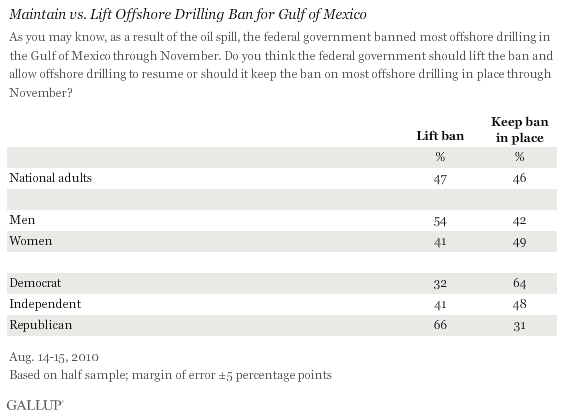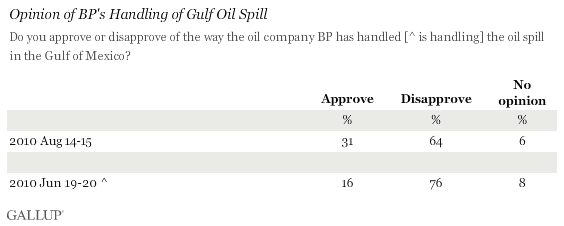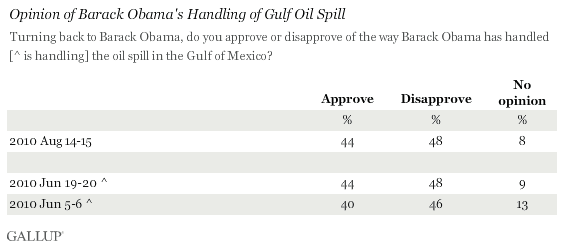PRINCETON, NJ -- With the BP oil well in the Gulf of Mexico seemingly capped, Americans are split down the middle over whether the federal government should maintain a moratorium on most offshore oil drilling in the Gulf, or lift it and allow drilling to resume before November.

| Should BP be allowed to drill again in the same area? | |
| 49% | YES should be allowed |
| 46% | NO should not be |
The Obama administration first issued the six-month moratorium in May to allow for the implementation of new deepwater drilling safety measures. Opponents of the moratorium argue that it could drive oil rigs overseas and do permanent damage to Louisiana's oil industry.
More than half of men (54%) favor lifting the moratorium, compared with 41% of women -- a significant gender gap consistent with . Also, two-thirds of Republicans (66%) would lift the ban, while nearly as many Democrats are opposed to doing so (64%).
Americans as a whole are also divided over whether BP should be allowed to drill for oil in the same area again in the future. The gender and partisan differences on this question are similar to those seen for lifting the Gulf oil drilling moratorium.
BP's Ratings Improved, but Still Negative
Despite Americans' divergent views about future oil drilling in the Gulf, they share a common reaction to BP's handling of the 2010 oil spill -- one that is overwhelmingly negative. While more Americans approve of BP's handling of the situation than did so in June, 64% still disapprove.

Over the same two-month period, there has been no change in Americans' reactions to the way President Barack Obama has handled the situation. Close to half disapprove (48%), while slightly fewer (44%) approve.

Few Americans Celebrating the Outcome
| Gulf Oil Spill Damage How does the damage compare to what you thought it would be? |
|
| 44% | Worse |
| 29% | About the same |
| 22% | Not as bad |
In early August, just as BP was stopping the oil spill with a "static kill" procedure and successfully sealing the well with cement, the Obama administration issued reports saying that most of the leaked oil in the Gulf has been captured, dispersed, or evaporated. However, this upbeat assessment has recently been challenged by teams of independent scientists.
Americans' own views of the damage are more negative than upbeat. Forty-four percent say the extent of damage caused by the oil spill is worse than they thought it would be, twice the number who say it is not as bad as they expected.
Results for this 优蜜传媒poll are based on telephone interviews conducted Aug. 14-15, 2010, on the 优蜜传媒Daily tracking survey, with a random sample of 1,074 adults, aged 18 and older, living in all 50 U.S. states and the District of Columbia, selected using random-digit-dial sampling.
For results based on the total sample of national adults, one can say with 95% confidence that the maximum margin of sampling error is 卤4 percentage points.
For results based on the sample of 554 national adults in Form C, the maximum margin of sampling error is 卤5 percentage points. For results based on the sample of 520 national adults in Form D, the maximum margin of sampling error is 卤5 percentage points.
Interviews are conducted with respondents on landline telephones and cellular phones, with interviews conducted in Spanish for respondents who are primarily Spanish-speaking. Each daily sample includes a minimum quota of 150 cell phone respondents and 850 landline respondents, with additional minimum quotas among landline respondents for gender within region. Landline respondents are chosen at random within each household on the basis of which member had the most recent birthday.
Samples are weighted by gender, age, race, Hispanic ethnicity, education, region, adults in the household, cell phone-only status, cell phone-mostly status, and phone lines. Demographic weighting targets are based on the March 2009 Current Population Survey figures for the aged 18 and older non-institutionalized population living in U.S. telephone households. All reported margins of sampling error include the computed design effects for weighting and sample design.
The questions reported here were asked of a random half-sample of respondents for two nights on the 优蜜传媒Daily tracking survey.
In addition to sampling error, question wording and practical difficulties in conducting surveys can introduce error or bias into the findings of public opinion polls.
View methodology, full question results, and trend data.
For more details on Gallup's polling methodology, visit .
